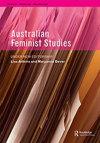Commodified Nature: Intertwined Threads of Identification
IF 1.5
4区 社会学
Q2 WOMENS STUDIES
引用次数: 0
Abstract
ABSTRACT Environmentalist concerns have been consistently dismissed and disputed by conservative right-wing actors. In this article, I argue that anti-environmentalism, with its persistent links to anti-genderist, racist and classist discourses, is best understood through an ecofeminist lens. Within hegemonic development discourse, nature is routinely apprehended as a commodity to be used. I argue that the conceptual framework which rationalises an unsustainable use of nonhuman nature is aligned to that which maintains unequal human relations, and that recognition of this alignment is vital to fighting the environmental crisis we all face today. Indeed, such recognition may foster more unified rather than fragmented efforts in this fight. In this article, I offer a thematic analysis of the discourses of the current far-right authoritarian Brazilian government and demonstrate how concepts of gender, race and class are intertwined with those of nature, development and sustainability, all contributing to the perpetuation of hegemonic identities which foster environmental exploitation. I conclude that to move forward we should turn instead to a reappraisal of what it means to be human and of what truly constitutes our self-interest as such.商业化的自然:交织的识别线索
摘要环保主义者的担忧一直被保守的右翼行为者所忽视和争议。在这篇文章中,我认为,反环保主义与其反性别主义、种族主义和古典主义话语之间的持续联系,最好通过生态女权主义的视角来理解。在霸权主义的发展话语中,自然通常被理解为一种需要使用的商品。我认为,将不可持续地利用非人性合理化的概念框架与维持不平等人际关系的概念框架是一致的,认识到这种一致性对于应对我们今天面临的环境危机至关重要。事实上,这种承认可能会促进这场斗争中更加统一而非分散的努力。在这篇文章中,我对当前巴西极右翼独裁政府的话语进行了主题分析,并展示了性别、种族和阶级的概念如何与自然、发展和可持续性的概念交织在一起,所有这些都助长了助长环境剥削的霸权身份的延续。我的结论是,为了向前迈进,我们应该重新评估作为人类意味着什么,以及什么才是我们自身利益的真正组成部分。
本文章由计算机程序翻译,如有差异,请以英文原文为准。
求助全文
约1分钟内获得全文
求助全文
来源期刊

Australian Feminist Studies
WOMENS STUDIES-
CiteScore
2.50
自引率
0.00%
发文量
7
期刊介绍:
Australian Feminist Studies was launched in the summer of 1985 by the Research Centre for Women"s Studies at the University of Adelaide. During the subsequent two decades it has become a leading journal of feminist studies. As an international, peer-reviewed journal, Australian Feminist Studies is proud to sustain a clear political commitment to feminist teaching, research and scholarship. The journal publishes articles of the highest calibre from all around the world, that contribute to current developments and issues across a spectrum of feminisms.
 求助内容:
求助内容: 应助结果提醒方式:
应助结果提醒方式:


